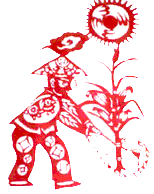
1. Faith
With various deities and religions such as Buddhism and Taoism believed in, different patron saints are worshiped in the production activities, the gods and the Buddha are adored in daily lives, and those in adverse situations beg for gods’ help with the realistic purposes of praying for peace, exemption from troubles, and luck.
In the past, land deity temples were distributed in rural areas with various unknown deities worshiped there. There are temples of gods in charge of easing floods in water town areas. In the coastal areas there are Mazu temples for people to pray for peace on the sea as well as the temples of fishery gods for good harvest in fishing. The dragon king is worshiped in drought to appeal for the rain and plays are staged when there is a fire disaster to pray to the god of fire. The founder of every trade is adored and the god of fortune is universally worshiped by business men and residents.
Temple fairs were usually held at Dongyue Temple, Town God’s Temple, Emperor Guan Temple, Temple of Yangs’ and King Yu’s Temple on the birth or death anniversaries of the gods, when the folk amusements such as plays, folk performances and stilts were staged to entertain the gods. The vendors would also get together to form the markets.
There were various activities of worship throughout the year. On the eighth of the first month of the lunar year, women would travel all the major temples in the area to pray for luck. There were quite a few customs during the lantern festival on the fourteenth of the first month of the lunar year. On the night women went to the temples to do prayers. Women long married but failing to conceive would ask her confidante to tie her on a citrus tree or a pomegranate tree and beat her gently with branches while saying prayers. The children would shake a bamboo in bamboo forests, praying for more rapid growth. Young wives and girls would perform a ritual to forecast some family affairs. In some areas people would throw 7 black beans onto the roof beams in the hope of avoiding the mice. On the night of the eighteenth of the first month of the lunar year, when people thought the dragon should return to the Heaven, dragon dances would be performed on the streets at late night, sacrifices offered at the altar and then the dragon would be burnt. On the night of the thirtieth of the seventh month of the lunar year, the birth anniversary of the King of the Inferno who was deemed a kind deity concerned about the sufferings of the people, incense would be burnt in every household. On the day of Greet Heat, in Jiazhi Town, Jiaojiang City, a 15-meter wood boat containing various sacrifices would be sent off the port in the ebb tide in the hope of bringing peace, and if it came back to the port with the rising tide, it was not a good omen.
Yin and yang, witchcraft, horoscope, selecting and forecasting a lucky day, fengshui were also practiced with witches and wizards sought to convey gods’ messages. When people were ill, the gods were worshiped in the hope of getting rid of the disease.
A lot of folk beliefs have been fading away with some extinct and the majority of the worshipers are senior women. In the 1950s, the temple fairs were replaced by the trade fairs organized by the commercial authorities and were gradually abandoned.
2. Taboos
The taboos usually originated from superstition. The families with a newly deceased member would use other words to refer to “death”. On sneezing or hearing the crows, one would shout “eliminating all troubles” to shed off the bad luck. Pregnant women were avoided into the bridal chamber. Breaking a mirror or a bowl should be avoided at the wedding. The uneven burning candles should be avoided in the bridal chamber. The paper with characters on should not be used as toilet paper.
In the coastal areas, the fish eyes should not be touched in eating fish. The fish should not be turned over in eating fish on boats. The word “turn” should not be said in sailing. Women were avoided on the fishing boats on the sea.
Many taboos have been eliminated nowadays but they are not totally extinct. Quite a few people are in suspicion but say they would rather admit them.
3. Societies
Folk societies and get-togethers have long been a custom. In addition to the activities of temple and shrine fairs, most of the modern societies were charity or mutual aid organizations with some secret societies.
Yiguan (righteous coffin) Society
The participants were the poor, who would pay a certain amount of money every year and get a coffin after death. It vanished after the founding of new China.
Money Society
It is a temporary financial mutual aid organization. There is no limit in the number of the members with most made up of ten, most of whom are relatives and friends. Funds are raised at certain times. The organization still exists nowadays.
Senior Citizen Society
It is thriving these years. One society may be set up in one village with no limit in member numbers. The funds come from the membership fees or the subsidies from the village. The senior citizens often get together for entertainment, participate in the public affairs, mediate civil disputes, comfort patients, and organize simple funerals for deceased members to promote frugality.
There are other public service organizations.